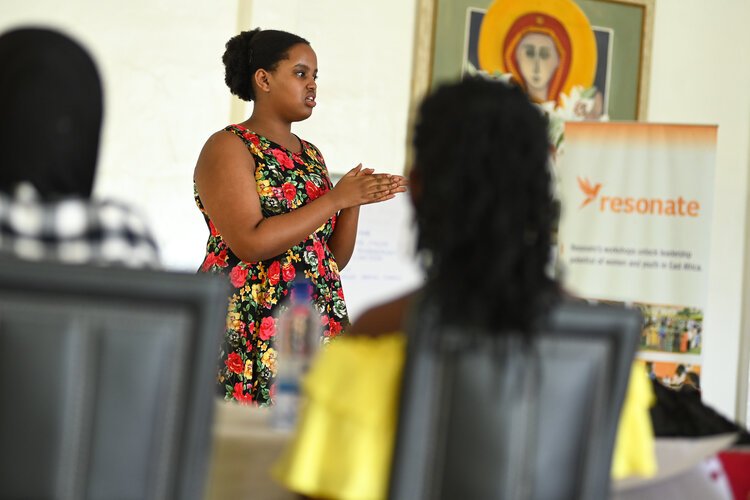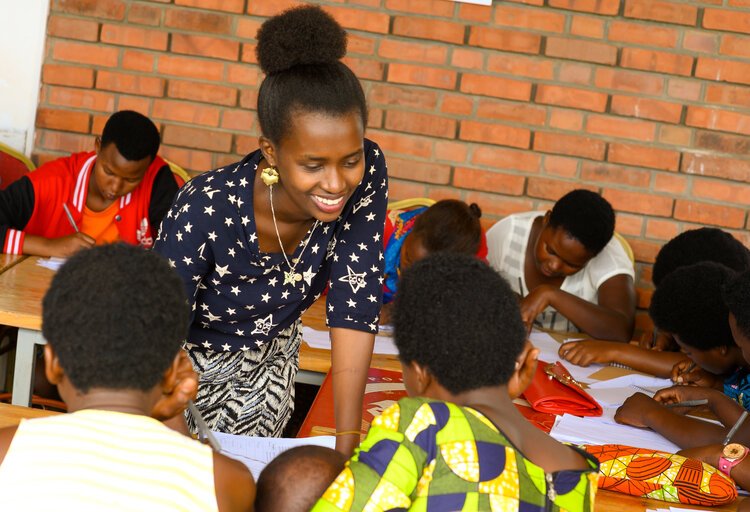Our Impact
Since our founding, we have worked with:
27,000+ participants
100+ partners in East Africa
In our 2022 end-of-year survey of participants, we have seen:
90% increase in leadership
in one or more of the following ways:
33% have started businesses
87% have taken on leadership roles
(Formal and Informal)
38% have got jobs
Participants’ Impact Stories
Louise’s Story
“The hummingbird story inspired me to think of how I could change my situation”
Marembo’s Story
“Before I could just read the curriculum for the girls I mentor, but today I use stories to help them understand the content and apply it fast.”
Martin’s Story
“I would say that Resonate changed my perspective of leadership, I did not have to be very superior but to be on the same level with the people I lead.”
Adelphine’s Story
“After Resonate’s training, I became more daring, and I am more confident in taking new opportunities.”
How We Measure Impact
We measure our impact in three key ways:
Quantitative Data - We measure increase in leadership capacity through pre- and post- surveys, as well as subsequent rigorous follow-ups with participants for one year after each partnership.
Qualitative data - We consistently evaluate our content, style, and team directly from our participants and partners.
Human-Centered Design - We actively seek input and feedback from participants and Program partners when designing new programs, including our Rwandan Advisory Board.
We’ve always tested our impact in a variety of ways, using input from advisors and best-practice knowledge. However, in order to rigorously measure the impact of our work, we conducted a pilot Randomized Control Trial (RCT) in 2016 with researchers from UC Berkeley, which produced fantastic results ( Read the full report here ) and began a full year-long RCT in 2019.
2019-2020 Randomized Control Trial Results
Overview
In August 2019 – November 2020, Researchers Megan Lang, Edward Soule, and Catherine Tinsley conducted a randomized control trial of Resonate’s programs. Resonate partnered with CARE Rwanda to deliver two different programs (Storytelling for Leadership and Professional Development) to CARE Rwanda participants, benchmarked against a cash control group.
Research Question
What are the impacts of Resonate’s Storytelling for Leadership and Professional Development workshops on psychosocial and economic outcomes for women in Rwanda?
Headline Results
Storytelling for leadership has strong impacts on psychosocial outcomes, and Professional Development has strong impacts on goals and economic outcomes.
Storytelling for Leadership (SFL)
Goal: participants shift their mindsets, so they begin to see themselves as leaders.
Process: identify values, develop stories about times when their actions reflected those values.
Professional Development (PD)
Goal: participants learn tools to help them achieve their goals and advance in their ambitions.
Process: modules on goal setting, networking to seek out opportunities, and public speaking.
Click here to read the Randomized Control Trial executive summary, and here for the full report.
Annual Reports
What We Have Learned
Measuring our Work is Hard
We learned that, although deeply important, measuring self-confidence and leadership is not straightforward. There are many qualitative and quantitative indicators that we have tested, and we have come up against many that don’t work. However, we have remained committed to finding an accurate way to measure our impact. We have come a long way in our approach to how to think about and measure personal transformation – and we’re still learning.
Impact is our Ultimate Goal
In 2016 we debated at length whether to become solely a non-profit or solely a business and there are credible reasons to both organizational models. Through this debate, we came to the conclusion that we are an impact-driven organization at our core. In order to reach the underserved women and girls that will benefit most from our trainings, we realized we shouldn’t sacrifice impact for financial sustainability, or vice versa. Thus, we have kept our blended revenue model and hybrid organizational structure to maximize both sustainability and impact.
It’s Important to Ask for Help
We are a small and ambitious team and we have learned the hard way that we can’t do everything by ourselves. We’ve learned to identify when it is time to ask for help and guidance from our Program partners, funders, partners, participants, and advisors. This is something we continually remind ourselves of through the incorporation of Human-Centered Design processes into our work. We have institutionalized a process where we must look for answers through asking others, rather than trying to come to conclusions on our own.







